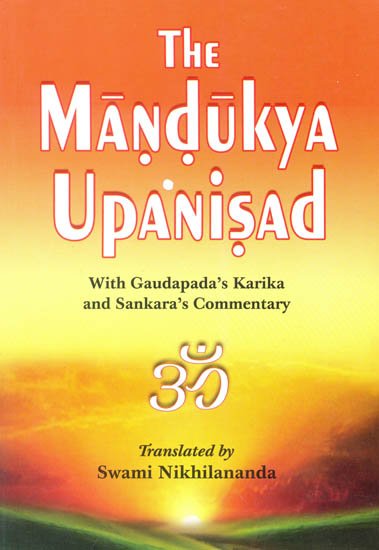Mandukya Upanishad (Gaudapa Karika and Shankara Bhashya)
by Swami Nikhilananda | 1949 | 115,575 words | ISBN-13: 9788175050228
This is verse 2.2 of the Mandukya Karika English translation, including commentaries by Gaudapada (Karika), Shankara (Bhashya) and a glossary by Anandagiri (Tika). Alternate transliteration: Māṇḍūkya-upaniṣad 2.2, Gauḍapāda Kārikā, Śaṅkara Bhāṣya, Ānandagiri Ṭīkā.
Mandukya Karika, verse 2.2
Sanskrit text, IAST transliteration and English translation
अदीर्घत्वाच्च कालस्य गत्वा देशान्नपश्यति ।
प्रतिबुद्धश्च वै सर्वस्तस्मिन्देशे न विद्यते ॥ २ ॥adīrghatvācca kālasya gatvā deśānnapaśyati |
pratibuddhaśca vai sarvastasmindeśe na vidyate || 2 ||2. On account of the shortness of time it is not possible for the dreamer to go out of the body and see (the dream objects). Nor does the dreamer, when he wakes up, find himself in the place (seen in his dream).
Shankara Bhashya (commentary)
That all that is perceived to exist in dreams is located in a limited space, is not a fact. For a man sleeping in the east, often finds himself, as it were1, experiencing dreams in the north. Anticipating this objection (of the opponent) it is said:—The dreamer does not go to another region outside his body where he experiences dream. For, it is found that as soon as a man falls asleep he experiences dream objects, as it were, at a place which is hundreds of Yojanas 2 away from his body and which can be reached only in the course of a month. The long period of time which is necessary to go to that region (where dream objects are perceived) and again to come back (to the place where the sleeper lies) is not found to be an actual fact. Hence on account of the shortness of time the experiencer of the dream does not go to another region. Moreover, the dreamer when he wakes up, does not find himself in the place where he experiences the dream. Had the man (really) gone to another place while dreaming and cognized (or perceived) the dream-objects there, then he would have certainly woke up there alone. But this does not happen. Though a man goes to sleep at night he feels as though he were seeing objects in the day-time and meeting many persons. (If that meeting were real) he ought to have been met by those persons (whom he himself met during the dream). But this does not happen; for if it did, they would have said, “We met you there to-day.” But this does not happen. Therefore one does not (really) go to another region in dream.
Anandagiri Tika (glossary)
1 As it were—The dream experiences, though they appear to be real to the dreamer, are not really so.
The experiences of dream are unreal on account of the absence of the appropriate time and place with which such experiences are associated. And this unreality can be known from the waking condition alone. The unreality of dream-experiences is proved here from the standpoint of time and space. For, those who believe in the reality of time and space cannot but admit the illusoriness of dream-experiences.
2 Yojam—It is a measure of distance of eight or nine miles.
